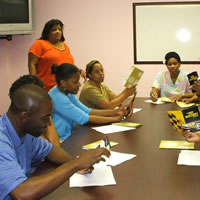 |
| Issue #3 - August 2010
Women's Health
Text4baby
LOL, (Laugh Out Loud), TTYL (Talk to You Later), 2moro, (Tomorrow), are you familiar with texting language? Text messaging has become an important means of communicating and not just with teens. Many people use texting to keep in touch with friends, family, even voting for their favorite personality on American Idol. Mobile phone texting is also a potentially powerful tool for disease management and health behavior change because it is widely available, inexpensive and instant. Find out about a new free texting service, text4baby, that is helping pregnant women and new moms care for themselves and give their babies a healthy start.
Text4baby is an educational program provided by the National Healthy Mothers, Healthy Babies Coalition (HMHB). Women can sign up for the free service by texting BABY to 511411 or (BEBE in Spanish). Three text messages are sent each week according to a woman's due date or her baby's date of birth. The messages are free and cover various topics critical to maternal and child health, including birth defects prevention, immunization, nutrition, seasonal flu, mental health, oral health and infant safe sleep. Some other text4baby messages connect women to prenatal and infant care services and other resources. The North Carolina Healthy Start Foundation is one of several North Carolina organizations that have signed up as a national partner. The Foundation has created point of purchase stands, promotional cards and posters to promote the services across the state.
Why is this initiative important? North Carolina's infant death rate continues to exceed the national average. Our most recent data from the State Center for Health Statistics (2008) indicate that there were 11,466 preterm births in North Carolina, representing 8.8% of live births. In the same year, 1,066 babies died before their first birthday. While our current initiatives and programs are making an impact to reduce the effects of this public health crisis, there is still much that can be done. This call to action demands new and innovative approaches to decrease the infant mortality rate and improve the health of women across our state. September is National Infant Mortality Awareness Month, a perfect time to promote text4baby. Join us in making a difference in the lives of mothers and babies and spread the word about text4baby!
 Infant Safe Sleep
Promoting Safe Sleep in Hospitals
Hospitals and medical centers are notoriously competitive. Why wouldn't they be? Every hospital wants their patients to know that they are getting the best care possible when they enter their doors. They strive to be the "most comprehensive cancer center", or the "only nationally accredited heart center". It may be hard to determine whether these accolades prove that one hospital is "better" than the next, but they ignite a fierce competition. However, in North Carolina, any competition that may exist between hospitals proves to be absent in relation to infant safe sleep. Find out how the North Carolina Healthy Start Foundation is leading the effort to promote infant safe sleep practices in hospitals across the state.
Since 2006, the Hospital Outreach and Partnerships for Education about Infant Safe Sleep (HOPES) Project has been bringing hospitals together to promote infant safe sleep through comprehensive hospital based programs. Key components of the program include; policy and practice, staff education, patient education and community outreach. Annual grants from the CJ Foundation for SIDS have been the primary source of financial support for this initiative.
In June, 33 representatives from 23 hospitals participated in HOPES regional meetings in Greenville and Charlotte, to discuss the critical role that hospital staff has in promoting infant safe sleep. In addition to getting the latest data on infant sleep related deaths and best practices, the meetings gave participants a rare opportunity to collaborate with colleagues from other hospitals. Nurses from across the state brainstormed and shared experiences in support of one common goal: the implementation of evidence-based infant safe sleep policies and practice at hospitals across North Carolina. Participants swapped business cards, shared in-house policies, presented their education plans and discussed ways to standardized care within mother-baby, nurseries and pediatrics units. Several hospitals acted as mentors for those new to infant safe sleep promotion.
Through these annual regional meetings, the North Carolina Healthy Start Foundation continues to provide a platform where the competition between hospitals does not exist because everyone has the same goal, to keep babies safe and healthy while they sleep. It's hard to believe that although SIDS is the leading cause of death of babies from one month to one year of age, many new parents leave the hospital with a new baby without all the information they need to reduce the risk of SIDS and prevent other sleep related infant deaths once they get home. The commitment of hospitals participating with HOPES is changing that for babies in North Carolina and making North Carolina a national leader.
 RICHES
Helping the Homeless
It’s estimated that nearly 3 million people in the U.S., including 1.3 million children, experience homelessness each year. The figures are just as alarming for North Carolina. In a 2008 survey conducted by the N.C. Department of Health and Human Services, 20% of children and nearly 30% of families were reported as homeless in more than 55 counties across our state. As many struggle to obtain the basic essentials such as food and shelter, it’s difficult for most if not all of this population to maintain a healthy lifestyle. Find out what one of our RICHES (Resources in Communities Helps Encourage Solutions) partners is doing in Durham to reach out to those in need.
Renee Parks-Bryant, RICHES network member and Health Education Specialist for the Durham County Health Department, has a passion for helping those who are not able to help themselves, especially the homeless. For nearly 17 years, Parks-Bryant has worked within Durham's Maternal and Child Health Department in the OB clinic. She's worked with countless women and their families; however over the years one particular client has stood out. County Health Department, has a passion for helping those who are not able to help themselves, especially the homeless. For nearly 17 years, Parks-Bryant has worked within Durham's Maternal and Child Health Department in the OB clinic. She's worked with countless women and their families; however over the years one particular client has stood out.
"I will never forget one of my former clients," she said. "She was homeless and being served by the Urban Ministries of Durham at the time. She called me one day and thanked me for the services I provided during her pregnancy. She is now employed and is living happily in the Triad area."
Parks-Bryant is hoping to reach more disadvantaged individuals using the new Health Journal Tool Kit developed by the North Carolina Healthy Start Foundation. "Just because they may not be as fortunate to have the very things we take for granted, doesn’t mean they should be deprived of information that could otherwise keep them healthy," she said.
The Health Journal Tool Kit was developed to use with community groups and in one-on-one settings. The easy to use flipchart is a great conversation starter about recommended check-ups, ways to be physically and emotionally healthier, knowing your family’s health history, and lifestyle issues that impact health. Two companion pieces My Health Journal (for women)
and the Body Maintenance Manual (for men) give individuals a way to learn and record their personal health information and goals.
On May 22nd Parks-Bryant presented the Health Journal Toolkit at the
Second Annual Beloved Community Resource Fair hosted by the Urban Ministries of Durham. This annual resource fair and picnic connects underserved individuals and their families with local community-based and faith-based organizations providing health and financial services information. Nearly 350 individuals including men, women and young children attended the event. Parks-Bryant said many were intrigued by the Health Journal Tool Kit and materials.
"Many participants felt that it was a useful resource," she said. "Many stated that they can now keep all of their health information in one place." As a health educator Parks-Bryant said she felt it was particularly important to point out the significance of getting routine check-ups and to keep track of their blood pressure and any warning signs related to heart disease or diabetes. She said many of the fair's attendees are getting back on their feet thanks to the help of Urban Ministries and other local organizations. She wants to make sure that not only do they get back on track financially but physically as well.
Before the event was over, Parks-Bryant said she distributed nearly 20 My Health Journals and Body Maintenance Manuals to the public. She said she looks forward to presenting the Health Journal Tool Kit at the next annual Beloved Community Resource Fair.
"They all deserve a second chance at life," she said. "No one should be left behind and surely not forgotten."
 Latina Health
Lost in Translation?
Training Can Help!
Have you ever visited a place where you don’t speak the native language and tried to order lunch? Not being able to communicate what you want can be a frustrating experience. Now imagine if what you're trying to communicate is as important as your healthcare needs. Communicating with clients who have limited English speaking skills can sometimes be difficult if you don’t have trained bilingual staff and/or interpreters. If you have felt frustrated without an interpreter, imagine how your client must feel if they aren’t able to get what they need from an appointment.
Studies have found that Latinos with limited English proficiency are less likely to visit a doctor or clinic, go to an ER or get a prescription filled. This problem is magnified for a Latina client who is depressed. About 43% of Latina mothers in North Carolina report feeling depressed after they have a baby. For many Latinas, depression is considered to be a "mal de los nervios" (nervous problem) which they are likely to treat with different teas such as "te de manzanilla" (chamomile tea) to calm frayed nerves. Latinas might be reluctant to tell their providers how they feel out of fear they will be considered "crazy" or fear that their children will be being taken away.
Depression is a serious issue, but treatment may be difficult without bilingual mental health providers. Using interpreters may not always work in a mental health situation. Latina clients may feel uncomfortable sharing their feelings with two people; the interpreter and the provider. If the interpreter is someone known by the community, Latina clients may fear that their private information will be shared. So how do you solve this problem?
One recent intervention in Chapel Hill, N.C. is proving that with the right training, the use of interpreters in a mental health situation can work. The Early Head Start Latina Mothers Study found that the key is to train both the mental health provider and interpreter and to work together to gain the trust of the Latina client. Participants who received treatment through this project had fewer symptoms of depression after the intervention. For a mental health session to be effective, the client needs to feel she is talking to the provider. To be effective an interpreter needs to:
Sit/stand in a way that reduces eye contact with either the provider or the client. The provider and client need to look and speak to each other.
- Speak in the first person and repeat the intonation of the original emotional tone and feeling.
- Be well versed in the vocabulary used, both in English and Spanish.
- If a client directs a question to the interpreter, it should be translated for the benefit of the provider and the client should be informed that the interpreter can’t answer at that moment. This is to encourage clients to be their own advocates and not rely on interpreters to be their advocates.
- Do not add own beliefs and/or opinions during the session as these can reduce the therapeutic intention of the provider's words.
In turn, the provider must do the following:
- Speak directly to the client.
- Speak in short phrases to allow for correct interpretation.
- Do not use idiomatic expressions such as "How do you deal with that?" Instead say, "What do you do to solve that problem?"
- Choose words carefully. The fewer words, the more accurate the interpretation.
- Debrief after the session with the interpreter.
For more information on this intervention visit the UNC School of Nursing web site page 'The 'Wings' Depressive Symptom Intervention for Latina Mothers."
 Foundation News
Leadership Behind the Scenes
Behind the accomplishments of any great organization is a small group of people who are often invisible to the public – the agency’s Board of Directors. Over its 20 year history, the North Carolina Healthy Start Foundation has had the great fortune of having a small but talented board, led by some of the finest professionals in the state. Our current board and board leadership are no exception.
On July 1st the Foundation welcomed four new board members. James (Jed) Hysong, CPA and Assistant Vice President of Financial Accounting with Credit Suisse; Dr. Elizabeth (Betsey) Tilson, Medical Director, Community Care of Wake and Johnston counties and pediatrician with Wake Human Services; Dr. Evelyn Varnado, OB/GYN with Triad Women’s Health Center, and Buck Wilson, Health Director, Cumberland County Health Department.
In addition, four directors were elected to leadership roles. After six years as Chair of the Board, guiding the agency during years of programmatic growth, Tom Bacon, Director for the N.C. Area Health Education Center, passed the baton to Dorothy Cilenti. Tom’s leadership as well as his commitment to the agency’s mission and staff has been a significant factor in the agency’s success. Dorothy is the Deputy Director of the UNC Gillings School of Global Public Health’s N.C. Institute for Public Health. She is also clinical assistant professor of maternal and child health at the UNC public health school. She has significant local and state level experience developing policies and programs benefiting women and children.
Many thanks go to Dr. Eleanor Greene, outgoing Vice Chair, who has served two full terms on the board and Judge Bob Hunter, outgoing Board Treasurer and long-standing director. Judge Hunter's new role as a Director Emeritus acknowledges his leadership, dedication and years of service to the Foundation.
Officers
Dorothy Cilenti, Dr.P.H., Chair
UNC Gillings School of Global Public Health
Robert (Bob) Garren, M.B.A., Vice Chair
International Textile Group
James (Jed) Hysong, C.P.A., Treasurer
Credit Suisse
Keischa Lovelace, Secretary
N.C. Industrial CommissionDirectors
Thomas J. Bacon, N.C. Area Health Education Center
Kathryn Millican, Blue Cross and Blue Shield of North Carolina
Cynthia Redd, WakeMed
Rita Robbins, Rita Robbins Properties and Investments
Elizabeth (Betsey) Tilson, M.D., Wake Human Services, Community Care (Wake and Johnston counties)
Evelyn (Benita) Varnado, M.D., Triad Women’s Center
Buck Wilson, Cumberland County Health DepartmentDirectors Emeritus
Stuart O. Bondurant, M.D., UNC-Chapel Hill, School of Medicine
Howard Fitts, Ed.D, Retired, N.C. Central University
Judge Bob Hunter, N.C. Court of Appeals
Charles A. Sanders, M.D., Former Chairman and CEO, Glaxo, Inc.

|


N.C. Healthy Start Foundation | 1300 St. Mary's Street, Suite 204 | Raleigh, NC 27605 | 919-828-1819
[email protected]
|
|
|